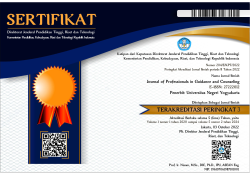Psychological condition of the elderly in the nursing home
DOI:
https://doi.org/10.21831/progcouns.v3i1.48587Keywords:
psychological condition, elderly, social institution.Abstract
Individuals who have good psychological conditions will commonly be able to create social relatedness and good moral feelings. The purpose of this study was to determine the social and moral feelings of the elderly in the Ikhwanus Shafa Lasi Mudo nursing home in Canduang District, Indonesia. This research used descriptive approach taking six key informants who are elderly residents aged 60 years and over, and the supporting informants consisted of two caregivers. The observation and interview results were analysed by reduction, presentation, verification, and comparison of the results. Specifically, this study focused on social feelings, sense of brotherhood, sympathy for friends who are in the orphanage environment, and sense of affection for others. It was found that in general, there showed a lack a sense of solidarity among others, a lack sense of help and respect. The elderly in this study informed that they developed such feelings that they are too close to the people in the orphanage compared to their family members. However, the moral feeling of the elderly has shown a good relationship between values and ethics (morals), where the elderly were able to take responsibility, feel guilty when violating norms, and feel at ease when obeying norms.
References
Abdi, S., Spann, A., Borilovic, J., de Witte, L., & Hawley, M. (2019). Understanding the care and support needs of older people: a scoping review and categorization using the WHO international classification of functioning, disability, and health framework (ICF). BMC geriatrics, 19(1), 1-15. DOI: https://doi.org/10.1186/s12877-019-1189-9.
Aleydrus, A. (2014). Perbedaan Penyesuaian Diri Pada Lansia Yang Tinggal di Panti Werdha" Pangesti" Lawang Dengan Lansia Yang Tinggal Bersama Keluarga di Kecamatan Lawang Kabupaten Malang. PSIKOVIDYA, 18(2).
Ariyani, A. M. (2013). Lansia di panti werdha (Studi deskriptif mengenai proses adaptasi lansia di panti werdha Hargo Dedali Surabaya). Jurnal Ilmu Sosial dan Ilmu Politik.[serial online]. http://journal. unair. ac. id/filerPDF/aun517da884a4full. pdf.
Busemeyer, M. R., & Lober, D. (2020). Between solidarity and self-interest: the elderly and support for public education revisited. Journal of Social Policy, 49(2), 425-444.
Faemy, A. N., Andayani, R. H. R., & Ningrum, S. R. (2021). Elderly Self Adjustment at Tresna Werdha Blitar Social Services Tulungagung Dormitory. Indonesian Journal of Social Work, 5(1), 44-59.
Hurlock, E. B. (1980). Developmental Psychology a Live Span Approach. (terj. Istiwidayanti dan Soedjarwo). Edisi Kelima. Jakarta: Penerbit Erlangga.
Kahrazei, F & Akbarizadeh, A. 2020. Comparison of the General Health and Happiness of the Elderly Living in Nursing Homes, Private Homes with and without Family-based Rehabilitation Services. Journal of Gerontology, 4(3), 56-67. DOI: 10.29252/joge.4.3.56.
Kovalenko, O. H., & Spivak, L. M. (2018). Psychological well-being of elderly people: The social factors. Social Welfare: Interdisciplinary Approach, 1(8), 163-176.
Larasati, A. N., & Boy, E. (2019). The impact of physical activity in elderly. MAGNA MEDIKA: Berkala Ilmiah Kedokteran dan Kesehatan, 6(2), 113-121.
Lee, S. B., Oh, J. H., Park, J. H., Choi, S. P., & Wee, J. H. (2018). Differences in youngest-old, middle-old, and oldest-old patients who visit the emergency department. Clinical and experimental emergency medicine, 5(4), 249–255. https://doi.org/10.15441/ceem.17.261.
Muchiri, W. A., Olutende, O. M., Kweyu, I. W., & Vurigwa, E. (2018). Meaning of physical activities for the elderly: a review. American Journal of Sports Science and Medicine, 6(3), 79-83.
Royadi, D., Susiana, N., & Khumaida, F. A. (2019). Effectiveness management of qualitative research in writing scientific papers. Aptisi Transactions on Management (ATM), 3(1), 84-90.
Sigalingging, G., Sitopu, S. D., & Sihaloho, L. (2020). Karakteristik Lanjut Usia yang Mengalami Gangguan Memori. Jurnal Darma Agung Husada, 7(1), 33-44.
Sincihu, Y., Maramis, W. F., & Rezki, M. N. (2018). Improve the quality of life of elderly through family role. KEMAS: Jurnal Kesehatan Masyarakat, 13(3), 374-381.
Suharsimi Arikunto. 2010. Research Management. Jakarta: Rineka Cipta.
Suleha, R., Tajuddin, I., & Amal, A. J. (2017, August). The Differences in Life Satisfaction between the Elderly Who Live in Senior Home Care and Living with the Family. In 8th International Conference of Asian Association of Indigenous and Cultural Psychology (ICAAIP 2017) (pp. 268-272). Atlantis Press.
Tohirin. 2012. Qualitative Research Methods in Education And Counseling Guidance. Jakarta: Rajawali Persada
Triwanti, S. P., Ishartono, I., & Gutama, A. S. (2015). Peran Panti Sosial Tresna Werdha Dalam Upaya Meningkatkan Kesejahteraan Lansia. Prosiding Penelitian dan Pengabdian kepada Masyarakat, 2(3).
Zadworna-CieÅ›lak, M. 2020. Psychometric properties of the Developmental Tasks Questionnaire for Seniors. Current Psychology, 39(4), 1172–1180. https://doi.org/10.1007/s12144-019-00380-0.
Downloads
Published
How to Cite
Issue
Section
License
 | ProGCouns: Professional Guidance and Counseling Journal is licensed under a Creative Commons Attribution-ShareAlike 4.0 International License. |













